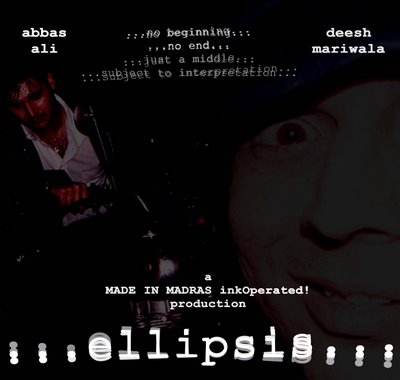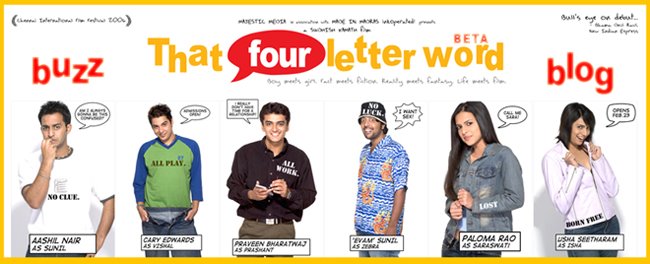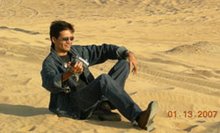Money. We always knew it can create, we didn’t know it can also corrupt. We had a producer in Sashi who was willing to invest about 17 lakhs in the film. That was a lot of money for us. Until one day, Levis came and said: “Take ten from me. I want to be part of this film too.” And then, we decided to exploit the potential of in-film promos. We tried more sponsors first through our own company, then gave up and tied up with Ogilvy to get sponsors. That took us a year and a half before deals got finalized. Then we shot a promo. And tried some more to get sponsors. That didn’t work, so we had to make Sashi spend all the money. We spent about 11 lakhs making the film. We shot almost 95 per cent of it. Just another five per cent was left and life began playing games with us. One of our cast members didn’t have dates because she was now an RJ and said she couldn’t spare “even half a day” because her boss was strict. Another guy broke his knee and was advised bed rest for six months. In that period, Sashi’s daughter was diagnosed with tumour and the rest of the cast got busy with their respective careers. Cary and Usha became Southern Spice VJs. Ranvir was away, first in the middle of action, thanks to the Pooja Bhat episode, and then out of action due to an accident and then busy again in life with Lakshya. Getting common dates became a hassle. Mid of last year, one and a half years after we last shot the film, we guys got finally together and decided something had to be done. Sashi said he will give us the last instalment of five lakhs to complete the film. There was no way we couldn’t shoot parts of the film replacing two of our cast members, so we decided that it was easier to shoot the whole film again. Abbas volunteered to be Executive Producer, it was a shot in the arm for the team. In the last months, we did our best to get sponsors, but it is always difficult to get people to part with their money in the last quarter of a year. So all we have now are promises from different corporates, not a penny in hand. How long can we wait? Usha had been postponing her visit to see her sister in America for the last six months, she got a visa some five months ago. She finally had booked her ticket for mid April after we assured her we will finish by March. So two weeks ago, we took the call to go ahead and finish it, no matter what. With or without money. People have been doing it. One of my one-time assistant director Pradeep had got together with his friend Vijay last November for a cup of tea. They wrote a script by November 17, auditioned people and started shooting by November 24 and finished shoot by December 17 and editing by January 7 this year!! With no money at all, sheer will-power!!!
Pradeep and Vijay, today, are my inspiration.
I did this scriptwriting workshop at SRM mid last year and at the end of it, as a part of my motivational exercise told them to write a feature length script in 30 days and if they did, I would personally ensure that the director will provide them with the camera and the editing set-up for the shoot. Early February this year, I got a call from their director. They had a film on them. A completed one. They, today, are my inspiration.
Money corrupts a project. Will-power gives it the boost. Today we don’t have any money. But we have the will, we have people, we have the spirit. What more do we need, huh?
Having said that, thank you Mom!! For letting me steal money from your account to do the movie.
With so many difficulties, many would have given up. But you *REALLY* persevere. Why?
Ah, no way. Why would we even think of giving up on something that means the world to us. That’s like quitting life. Plus, if you’ve spent five and a half years on something, you surely don’t want that much of work to go down the drain, do you? It’s just that that kept us going. This film has changed our lives. We owe it to this film and give it some life now.
Dealing with high profile stars has its own difficulties. Why don’t you use fresh faces? After all, movies like Hyderabad Blues and Kaadhal really didn’t have big stars.
Well, like I said, the film wasn’t written for stars. The film found these stars. Every artiste wants a script he/she can relate to. I guess that worked for our film. Every person involved is in the film, not because he/she is a star but because they believe in the script and they can so relate to it. And hey, it helps to have stars because I know hundreds of filmmakers in the country who have not found distributors because we have such a dim-witted system that believes in names to sell a film. I know many completed films which haven’t found buyers because they didn’t have stars. Even Hyderabad Blues had to wait for four years after it was made before it hit the screen and Kaadhal had Boys Bharat who was a name. With the clutter of so many promos, these days we only decide to watch films if we know some face behind the film. Sudhish is hardly a face, Abbas is, Cary is, Usha today is … it’s these faces you see in the promos that actually help you make up your mind if you want to see the film or not. And no, though we fought like mad dogs on the project, we never had any major problems because we always knew that each of us wanted the film to be good.
Even if Abbas isn't a part of the film now, he will always remain a part of our family, as one of those responsible for seeing the film through.
 DVD cover of the short film I made with Abbas years ago
DVD cover of the short film I made with Abbas years ago
Ellipsis was shot in two nights in the middle of a cyclone
You movie is one of the first ventures to be shot fully in digital format. What difficulties do you face with it?
There were very few difficulties as such. Though it would have been easier for us had we not shot using sync sound (location sound). Sync sound is something very few have attempted… something only what a Kamal Hasan has tried before here in the South. Farhan did it too for Dil Chahta Hai. And it’s the toughest thing when you are shooting in real locations. If you shut everyone up on the set, even the most real locations look like a set. If you don’t, it turns too noisy that you can hardly hear the lines. Then there’s the sound of the blast of the AC, other ambience noise … like traffic for example, which require you to go in for more and more retakes. This time, we’d rather go in for dubbing. Other than that, video has its limitations. There is the inherent danger of the film looking like a TV serial, because all said and done, the canvas is smaller when you shoot on video. But the advantages of shooting on video really more than make up for the difficulties. If not for video, most of us wouldn’t have ever made a movie!
Does your movie have music?
Yes, we have this American rap/hiphop/fusion band called Karmacy that has recorded a title track for us. And they are giving us another two songs. Asif Ali, our music director sat with Cary and recorded about 20 scratch songs, we’ve shortlisted quite a few of them. This time around, Asif has done another ten songs, mostly instrumental. It’s about young people. There’s got to be music.
What lessons have you learnt in filmmaking?
Oh plenty. First as a scriptwriter, I learnt how much I should NOT write. As a director, I learnt how much I should NOT take from the script. A director does not just take a script and translate it to film, he adds value and character to the film. He eliminates words and replaces them with visuals. He takes 95 per cent of the text and puts it in context and uses it as subtext. I learnt that there is no limit to how much you can add to a script. A script is basically made up of a page a minute, it probably packs ten ideas a page and is probably made up of, say, a thousand ideas which tell a story. A director needs to take each of these thousand ideas and express each of these using another ten, twenty, thirty, forty, hundred or more ideas depending on the importance and the magnitude of the idea, keeping the desired impact in mind. The lessons are many. The biggest lesson is that there are many more to be learnt. And you won’t learn till you’ve made the mistakes. I’ve made a million mistakes. I’d like to believe I’ve learnt a million lessons.


No comments:
Post a Comment